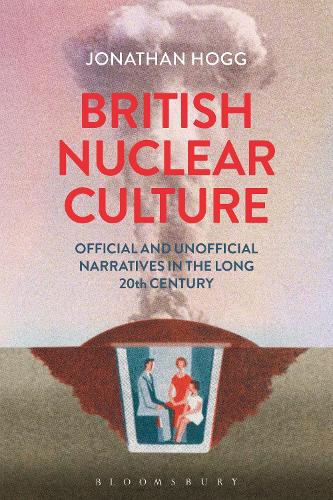
British Nuclear Culture: Official and Unofficial Narratives in the Long 20th Century
(Paperback)
Available Formats
Publishing Details
British Nuclear Culture: Official and Unofficial Narratives in the Long 20th Century
By (Author) Dr Jonathan Hogg
Bloomsbury Publishing PLC
Bloomsbury Academic USA
28th January 2016
United States
Classifications
Tertiary Education
Non Fiction
Social and cultural history
European history
941.085
Physical Properties
Paperback
248
Width 156mm, Height 234mm
354g
Description
The advent of the atomic bomb, the social and cultural impact of nuclear science, and the history of the British nuclear state after 1945 is a complex and contested story. British Nuclear Culture is an important survey that offers a new interpretation of the nuclear century by tracing the tensions between official and unofficial nuclear narratives in British culture. In this book, Jonathan Hogg argues that nuclear culture was a pervasive and persistent aspect of British life, particularly in the years following 1945. This idea is illustrated through detailed analysis of various primary source materials, such as newspaper articles, government files, fictional texts, film, music and oral testimonies. The book introduces unfamiliar sources to students of nuclear and cold war history, and offers in-depth and critical reflections on the expanding historiography in this area of research. Chronologically arranged, British Nuclear Culture reflects upon, and returns to, a number of key themes throughout, including nuclear anxiety, government policy, civil defence, nukespeak and nuclear subjectivity, individual experience, protest and resistance, and the influence of the British nuclear state on everyday life. The book contains illustrations, individual case studies, a select bibliography, a timeline, and a list of helpful online resources for students of nuclear history.
Reviews
[A] fascinating new book It is a real strength that it introduces the reader to a wide range of sources on the subject It is also extensively and impressively illustrated. * Journal of Contemporary History *
The first major contribution to what promises to be a significant sub-field of British nuclear history. * Reviews in History *
Hogg has produced a well-written and accessible history that covers a great deal of ground. It is a thought-provoking study that will appeal to a general readership as well as to students and scholars. * Twentieth Century British History *
Hogg uses a wide range of primary-source materials to analyse British nuclear culture following the Second World War. * Survival: Global Politics and Strategy *
The author persuasively argues that nuclear technology played a greater role in British politics and culture than previously thought. This book complements the extensive literature on the Cold War and contributes to a new understanding of the pervasiveness of the nuclear question in 20th-century Britain. * CHOICE *
British Nuclear Culture is an important book for mapping the terrain of this lightly trodden field. Jonathan Hogg has done the journeymans work of marshaling diverse bodies of cultural production to adumbrate this particular national zeitgeist; indeed, at times his account seems like a catalog of explicit references to the nuclear. * Journal of British Studies *
A gift to future scholars of British nuclear culture It reveals an enormous number of questions and texts that will occupy critics for many years to come. * Isis *
At long last, a book that takes a long view of Britain's fascination with nuclear science. Jonathan Hogg takes us back to the Victorian age to show that British nuclear culture was born decades before the Cold War and that it flourishes to this day. Along the way, he takes in everything from H. G. Wells and Ewan MacColl to Morrissey and Alan Partridge. British Nuclear Culture will appeal to scholars and students of history, literature, politics and the mass media, and just about anyone interested in why and how Britain has lived with The Bomb. * Tony Shaw, University of Hertfordshire *
We know the atomic bomb fundamentally transformed modern life, but Jonathan Hogg shows us that it did not do so in the same way everywhere. This is a important contribution to nuclear studies as it takes both nation and region seriously in the production of a nuclear culture. Hogg does not just follow expert concerns or defense policy debates, he also attends to the vernacular forms of local activisms across British cities and generations. British Nuclear Culture leads the way to a new comparative nuclear studies, and with it, a deeper understanding of the nuclear revolution. * Joseph P. Masco, University of Chicago, USA *
This book offers a far-reaching critical analysis of the extensive reach of nuclear culture, and of the ripple effects that spread, like the concentric circles frequently used to represent an atomic blast, through almost every aspect of British life during the creation and maintenance of the nuclear state. * Catherine Jolivette, Missouri State University, USA *
Author Bio
Jonathan Hogg is Senior Lecturer in History at the University of Liverpool, UK. He is the author of Using Primary Sources: A Practical Guide for Students (forthcoming).
